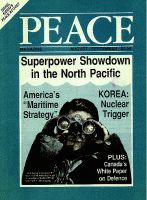
Peace Magazine Aug-Sep 1987, page 10. Some rights reserved.
Search for other articles by C.G. Gifford here
ON FEBRUARY 16 IN MOSCOW, MIKHAIL Gorbachev called for entering "the post nuclear age," an age, he said, "which will be immune to violence and attempts to dictate to others." Amen! But are the Soviets' proposals for arms control and disarmament the practical means of moving in this direction?
In recent months, the Soviets have proposed step by step bilateral elimination of nuclear weapons by the year 2000; the elimination of medium range missiles in Europe with 100 each being kept on the territories of the U.S. and the Soviet Union; talks on reducing the number of missiles with 500-1,000 km ranges; a speeding up of negotiations on reductions of conventional forces; and the creation of ''international procedures, including on-site inspection" to verity reduction.
The Soviets say they are ready to supplement "national technical means" [monitoring from abroad by satellites, seismographs, etc.] with monitoring by the Five Continent Peace Initiative countries, and have invited the U.S. to "consider creating a supranational monitoring network."
In Prague on April 11, Mr. Gorbachev said that the USSR has stopped producing chemical weapons, and said that verification measures regarding reduction of nuclear missiles should include on-site inspection of missile bases, test sites and production plants. These proposals follow the eighteen-month Soviet moratorium on nuclear testing, which they have said they will resume any time the United States stops testing. No doubt some of these measures have a one-upmanship element in them to present the Soviet Union as more peace-loving than NATO. No doubt also a desirable, businesslike way to proceed would be to present these in the negotiating rooms of Geneva rather than in public (and, who knows, this may have been done). But it is very difficult to see this flow of proposals as mere jockeying for a public relations advantage.
It appears to be a search for some opening to get the disarmament race started. It also appears to be a logical effort to implement the thinking expressed in Mr. Gorbachev's remarkable February 16 speech, and his emphasis, on February 28, on the impossibility now of separating one's own security from neighbors' in our interconnected world. No doubt one could imagine even more effective unilateral steps by the Warsaw Pact, such as moving tanks and motor troop transport back two days' travelling time from the NATO-Warsaw Pact border. Then only the extremist could argue that a Soviet invasion of Western Europe is possible. But such a radical action would require quieting Warsaw Pact fears of possible destabilizing actions by NATO. Thank God that realistic sounding initiatives are being articulated. I only wish Western governments were beating Mr. Gorbachev in a competition for practical proposals toward disarmament.
C.G. Gifford is President of Veterans Against Nuclear Arms.

Peace Magazine Aug-Sep 1987, page 10. Some rights reserved.
Search for other articles by C.G. Gifford here